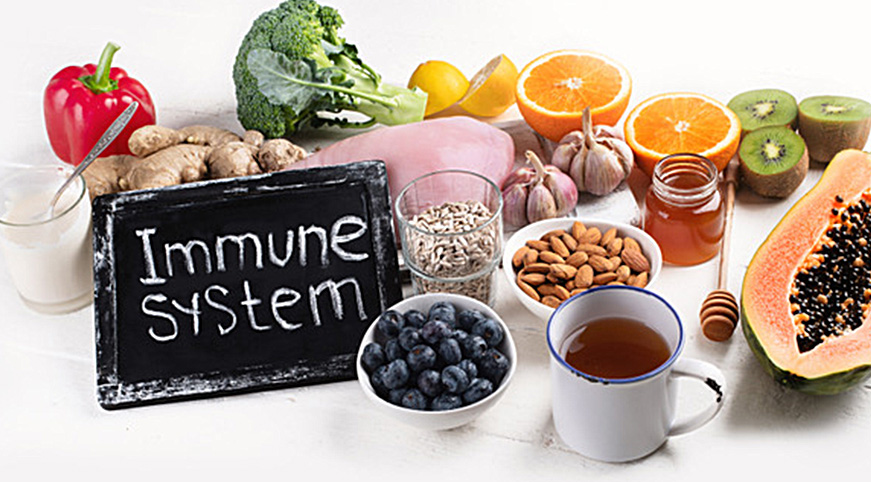A healthy and balanced diet is key to a strong immune system. Marilyn Berger, Registered Dietitian, shares essential vitamins and foods that support a healthy immune system.
Nutritious foods can strengthen the immune system. However, it would be somewhat flawed to say that any one vitamin, or special diet alone, could drastically improve one’s immune health. The immune system is a bit more complicated than that. There are many other factors affecting immune health, such as physical activity, stress, age, and presence of medical conditions.
It is still important to choose nutrient-dense foods as these foods often provide the most essential vitamins and minerals and have properties that aid in our immune health.
- Vitamin C is a powerful water-soluble antioxidant which contributes to immune health by supporting various cell functions against pathogens. It stimulates formation of antibodies and promotes function of white blood cells. Since our bodies cannot make vitamin C, it must come from foods. Good sources of vitamin C include citrus fruits like oranges and grapefruits, berries, tomatoes, melons, broccoli, and bell peppers.2
- Vitamin E is a fat-soluble antioxidant that protects from free radical damage to cell membranes and helps the body fight off infections. Foods high in vitamin E are often plant foods such as peanuts, almonds, hazelnuts, sunflower seeds and oils such as safflower, soybean, sunflower, and wheat germ oil.3
- Vitamin A helps fight infections by keeping tissues healthy in the stomach, intestines, respiratory system, mouth, and skin. Vitamin A can enhance the immune system’s defense against various infectious diseases.1 Foods high in Vitamin A are often more orange or red in color coming from carotenoids, such as carrots, pumpkin, cantaloupe, and butternut squash. There are also animal forms of vitamin A including fish, meat, organ meats, and dairy.4
- Zinc is a mineral with anti-inflammatory and antioxidant properties. It is needed for wound healing.3 Zinc homeostasis is also crucial for adequate immune system functioning. However, Zinc deficiency, as well as excess zinc, can result in severe disturbances in immune cell numbers and activities, which can result in increased susceptibility to infections and contribute to inflammatory diseases. Zinc is usually better absorbed from animal sources such as beef, poultry, and seafood like oysters and crab. Plant sources include chickpeas, beans, tofu, and nuts.4
- Iron helps carry oxygen to cells and is a component of enzymes important for immune cell function. Experimental evidence in the last decades show that iron is a fundamental element for normal development of the immune system. Inadequate iron affects the capacity to have an adequate immune response. Most individuals are able to obtain adequate amounts of iron through various food sources alone. Good sources of Iron include red meat, beans, fortified breakfast cereal, and nuts.5
- Vitamin D may be one of the most powerful nutrients towards supporting the immune system. Vitamin D can modulate the innate and adaptive immune responses. Deficiency in vitamin D is associated with increased autoimmunity as well as an increased susceptibility to infection. There have been multiple cross-sectional studies associating lower levels of vitamin D with increased infection. Vitamin D is obtained from the diet or it is synthesized in skin after exposure to UVB light. Also of note, season and sun block affect its synthesis. Foods that contain Vitamin D are typically Vitamin D fortified foods, like milk, cereal, and certain juices.6
- The body requires an ongoing supply of protein as it is needed to make and repair cells for muscles, organs, eyes, hair, and to fight infections. Foods that contain protein include meat, poultry, eggs, seafood, dairy, nuts, seeds, and legumes.7
Eating from various food groups provides an assortment of vitamins and minerals, which helps maintain a healthy immune system. Sadly, many omit fruits, vegetables, and other nutritious foods, often as a preference or due to lack of time for preparation. To help maintain a more varied nutrient intake, it may benefit some individuals to keep food diary of foods eaten. When our nutrient intake is limited, a single multivitamin supplement would be sufficient to fill in those gaps. One could also have certain vitamin levels checked, such as vitamin D, to more accurately know whether a certain supplement would be needed, as well as safe to take. Overall, to reap the benefits nutritionally, one should seek their vitamins directly from the food source itself.3
It’s important to remember hydration with approximately 8 cups of water daily, or as prescribed by a physician, to stay healthy and keep illness away.3 There is no quick fix when trying to maintain good immunity and preventing illnesses down the road. Keep in mind that for good immunity, you need a healthy diet with adequate hydration3, less stress, regular exercise (or as allowed by a physician), and a good night’s sleep.1
1Pronschinske, Jamie. “Nutrition and Immune Function.” Mayo Clinic Health System, 16 Nov. 2021, https://www.mayoclinichealthsystem.org/hometown-health/speaking-of-health/support-your-immune-function-with-good-nutrition.
2Vitamin C and Immune Function. Anitra C Carr et al. Nutrients. 2017. https://pubmed.ncbi.nlm.nih.gov/29099763/.
3Vitamins That Are Best for Boosting Your Immunity. https://health.clevelandclinic.org/vitamins-best-boosting-immunity.
4How to Keep Your immune System Healthy. Contributors: Esther Ellis, MS, RDN, LDN. Published; January 21, https://www.eatright.org/health/wellness/healthful-habits/how-to-keep-your-immune-system-healthy.
5Cleveland Clinic. December 4, 2020 / Nutrition 8 Vitamins & Minerals You Need for a Healthy Immune https://health.clevelandclinic.org/eat-these-foods-to-boost-your-immune-system/.
6What is Vitamin D. Contributors; Sarah KLEMM, R DN, CD LDN. Published; March 11, 2022 https://www.eatright.org/health/essential-nutrients/vitamins/what-is-vitamin-d.
7How much protein should I eat? Contributors; Esther Ellis, MS, RDN, LDN, Cordial is Msora-kasago MA,RD, Grace Derocha, MBA,RD, LD and Su Nui Escobar, DCN, RDN, FAND https://www.eatright.org/health/essential-nutrients/protein/how-much-protein-should-i-eat.
Go to our Blog
 ENGLISH
ENGLISH KOREAN
KOREAN Spanish
Spanish RUSSIAN
RUSSIAN Armenian
Armenian FILIPINO
FILIPINO Chinese (Simplified)
Chinese (Simplified) Chinese (Traditional)
Chinese (Traditional)


최신댓글